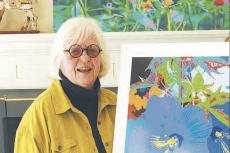This year isn’t shaping up to be a mellow one for political news. While most will be focused on the presidential race, a locally relevant competition will be held over an East Hampton Town Board seat now held by Ian Calder-Piedmonte, a Democrat appointed to the post in January. He faces a challenge from Hy Mariampolski, a first-time candidate running for the Republicans.
The winner will fill out the remaining year of the term vacated by Kathee Burke-Gonzalez when she became supervisor in January.
Mr. Calder-Piedmonte, 44, has farmed on the South Fork for 20 years as co-owner of Balsam Farms, and has been a resident of Springs since 2005. For 12 years he served on the town planning board, and was the vice chairman for the last two before he was tapped to take Ms. Burke-Gonzalez’s town board seat.
“I’m the only person on the current town board with planning board experience,” he said recently. “The planning board has already proven important a couple of times since I was appointed. I have that perspective and can bring something good to the table with that. Historically, the planning board has fed the town board because planning issues are very important to the town.”
Public service found Mr. Calder-Piedmonte; he didn’t move to the East End with political aspirations. “I really enjoyed my planning board service. It wasn’t something I sought out, but I liked helping people in the town, and I liked being part of fair government. At times there would be a complicated issue, and I felt I could contribute to solutions. That work led me to realize I could enjoy solving problems on the town board.”
He graduated from Cornell University with a degree in philosophy in 2002. “I value fairness above all else. Whenever you write a philosophy paper, the best thing to do is come up with the best counterargument and address it. If you pass by a substantial argument against your case, it’s easier for people to poke holes in it.”
“Genuinely, what I think I bring is an approach. I’m willing to change my mind on an issue if there’s a good argument,” he said. Perhaps that’s why he enjoys endorsements from Democrats such as former Town Supervisor Peter Van Scoyoc, Republicans like Reed Jones, former chairman of the planning board, and Pat Schutte, an Independence Party member who also worked with him on the planning board. “These are people I’ve worked with, and they come from all over the political spectrum. That they’ve all endorsed me shows that I’m a productive contributor to the process. It doesn’t make sense to have to align yourself on a group of issues and vote a specific way based on party affiliation,” he said. “Thought doesn’t work that way.”
However, if there is a specific issue that he feels needs tackling, it’s community housing. Mr. Calder-Piedmonte serves as town board liaison to the Housing Department and to the community housing advisory board. “It’s exciting to have this new pool of funding with the community housing fund that we are just now tapping into,” he said. “To have a healthy community, you need to have working-class people who can afford to live and work there.”
Mr. Mariampolski, a self-described “sociologist and marketing guru,” is in his 70s, and also concerned about housing, specifically about how it ties into aging in place. “Running for town board was kind of a result of rebuilding our house and seeing how much trouble we had. We thought it would be a simple process. We had zoning issues, and of course, we tried to get help from the planning board, but it was very difficult to deal with, an impediment to itself.” He said people would love to expand their houses to accommodate family, but when they try, it becomes an impossibility and unreasonably expensive. He has owned a house in East Hampton for 20 years.
He said illegal immigration was also fueling the housing crisis. “One of the ways the immigration issue hits the town is when you see houses with six or seven cars parked outside overnight. We have a terrible problem in this country with illegal immigration, and we’re not escaping it in East Hampton.” He said on the one hand, immigrants get blamed for things like gangs and drugs, but on the other, they feel victimized. “That’s a common feeling in the Latino community. Because I speak Spanish, I see myself as being able to represent the interests of the local Latinos.”
“I see things in the town growing increasingly political,” he said. “There is no Republican representation on the town board or on any major planning commission. I call it an anti-development, anti-business attitude.” He said the distinction between national and local politics is blurring, which offers him, who is Jewish, an opportunity. “I’m strongly affiliated with the Jewish community and very concerned about the way that democratic policies have evolved. They’ve become the antisemite party, the place where antisemitism has been less suppressed. Earlier this year when swastikas appeared in Montauk, I took it very personally. My family had been victims of genocide. People in East Hampton are looking for alternatives to the Democratic party and would see me as a welcome alternative.”
An expanding population could be partly to blame for the changing politics, he said, but he also blamed the internet and social media. “The population is more diverse than ever, and there are many more channels of communication. There’s a lot less consensus.”
At the same time, he said he enjoyed talking with Mr. Calder-Piedmonte at a recent gathering. “He’s a real gentleman. One thing I feel good about in East Hampton is that there’s still enough of a community where I can just chat with a board member like that. I feel privileged to live in a democracy and in a place where I can chat amicably with my opponent.”
Note: The print version of this story incorrectly said that the winner of the November election would serve out the remaining two years of the term vacated by Kathee Burke-Gonzalez when she became supervisor in January. By the time the winner takes office, there will be only one year remaining in that term.




